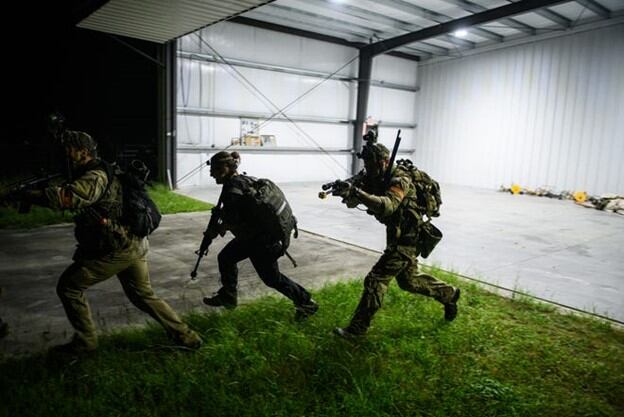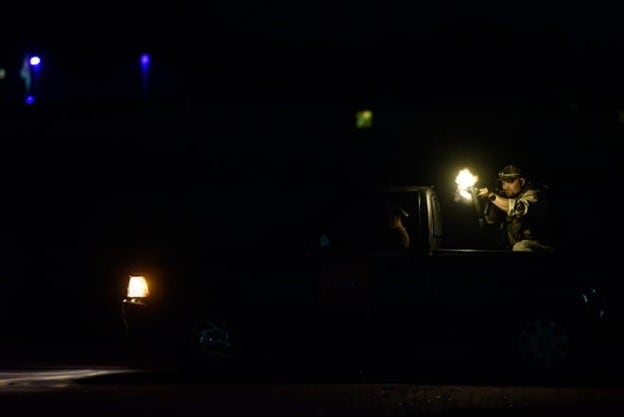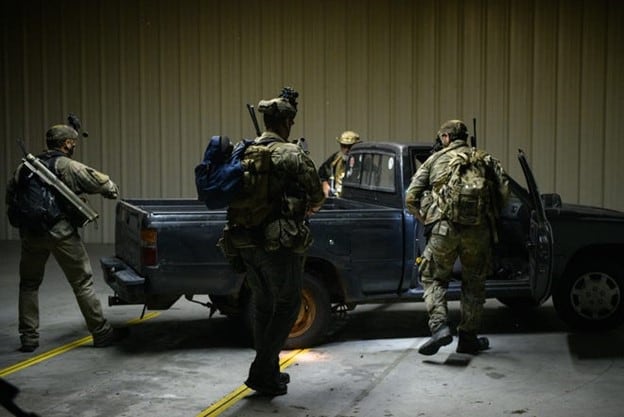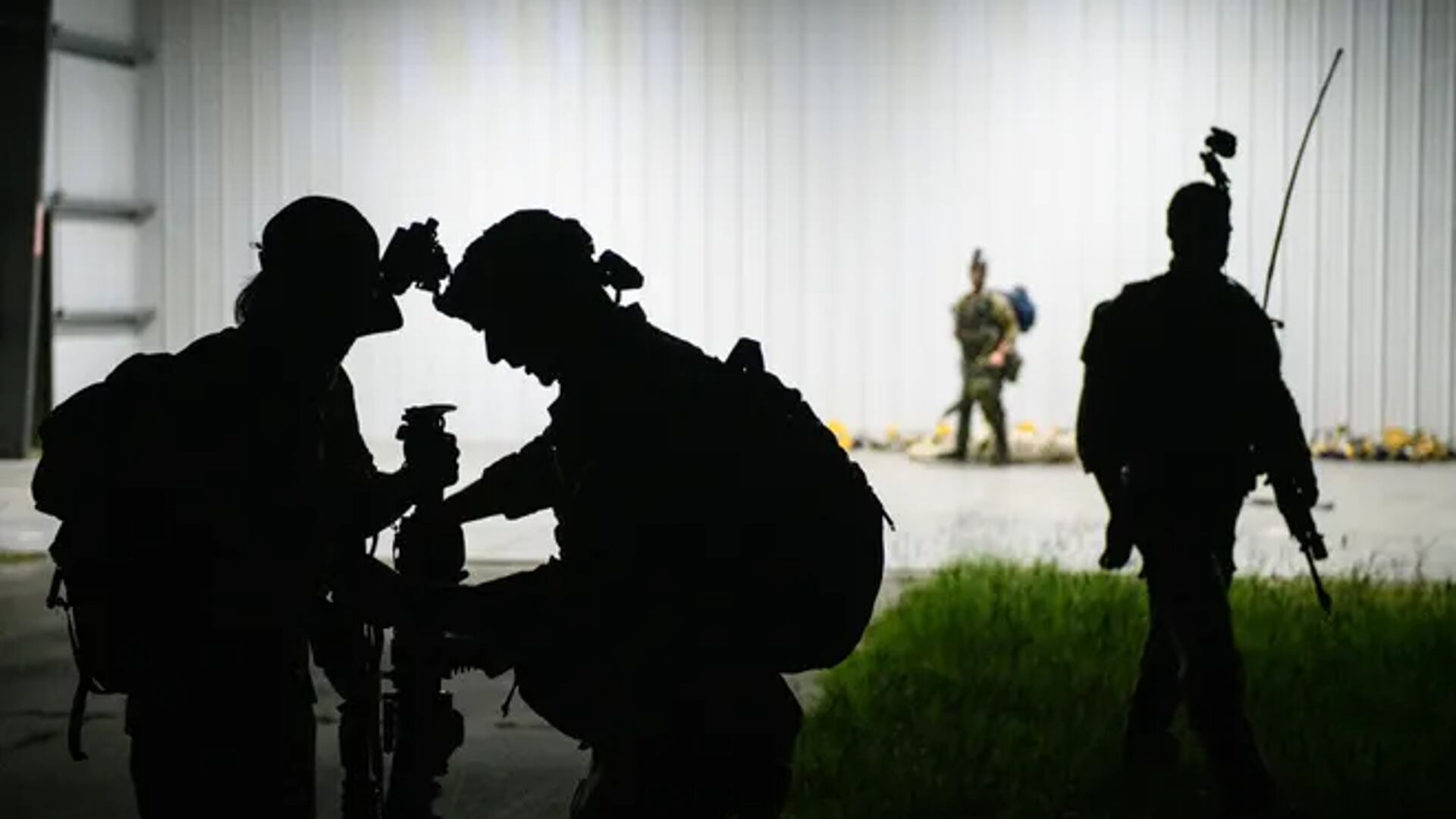Editor’s Note: This article was published as part of a content-sharing agreement between Army Times and The Fayetteville Observer.
Artillery simulators streaked across the airfield, while smoke filled the air last week at the Elizabethtown Airport as soldiers worked to secure the airfield.
The soldiers were the latest group going through the Special Forces two-week training exercise known as Robin Sage, which is held four times a year. To them on Sept. 26, the airport was part of a fictional country known as Pineland.
Robin Sage is the final test for the Special Forces Qualifications Course hosted by the U.S. Army John F. Kennedy Special Warfare Center and School based at Fort Liberty.

The unconventional warfare exercise was first called Robin Sage in 1974 for World War II prisoner of war Col. Jerry Sage, who was part of the first exercise held in Robbins in 1952.
For the exercise, about 16 different teams trained across 30 counties in North Carolina, South Carolina and Tennessee, said a Special Forces major who was the commander of the latest exercise and can’t be identified because of the nature of his job.
“They all are part of the Special Forces effort in our scenario to free the country of Pineland from the oppressive regime,” the major said.
A Special Forces master sergeant who was one of the lead cadre at the airport said last week’s scenario was that opposing forces seized part of the airfield to use as a reinforcement platform during a fight against conventional forces.
Among those portraying opposition forces, known in Pineland as the United Provinces of Atlantica, were Harnett County military veterans Patrick O’Kelley and Bert, whose last name is not being used because his two sons are planning to go through the Special Forces assessment phase.
O’Kelley said he served in the Army for more than 20 years including serving with the 82nd Airborne Division, 3rd Ranger Battalion, 5th Special Forces Group and 3rd special Forces Group followed by another 20 years as a Junior ROTC instructor in Lee County.
“Now, I’m just doing this to keep me off the streets,” O’Kelley said.
Bert, who retired as a sergeant major in 2011, served alongside special operation forces during his time in the Army. The two men got involved with Robin Sage about four years ago.
“When you get away from (the military), you really miss it a lot, and when you have an opportunity to come out and help train soldiers and you’re around soldiers and around like-minded folks. You’re trying to help mentor and develop,” Bert said.

O’Kelley strives to enhance the training by bringing his British Ferret armored car to the exercise, Bert said.
“There’s probably 50-60 counties over the world that use that thing,” Bert said.
If candidates don’t make it in and out of an area within 10 minutes, O’Kelley said, he and Bert show up in the Ferret, with one driving and the other firing simulated rounds out of the turret.
“With guerilla warfare, you’ve got to get in and get out,” he said. “Our job is to make it as painful and horrible as possible so in real life it doesn’t become that way, and so (the candidates) end up hating that thing.”
For O’Kelley, Robin Sage is “like a little family.”
Bert’s oldest son is a lieutenant in the 82nd Airborne Division who plans on to go through Special Forces assessment in January, while his youngest son who was recruited as a Special Forces candidate just finished basic training.
Their participation as civilian volunteers in Robin Sage led to their interest in Special Forces, he said.
The exercise
The major said the class learned basic tactics with small-unit training followed by job-specific training and a survival phase before the Robin Sage exercise.
Among their lessons was a study of unconventional warfare doctrine and how to develop networks for survival and then spend a week in the field to build team cohesion, he said.
“After that, they do a week of planning and do a detailed plan on how they’re going to do this operation, and then at the end of that planning, they start their infiltration into Pineland and finish out the final two weeks out here,” he said.
For the exercise, candidates organize a resistance force and build networks for transportation, logistics and intelligence.
Each team has a leader and team sergeant and soldiers with communications, medic, weapons and leadership skills, on which they train partner and indigenous forces.
“Medics will teach everyone the basic medical skills, the (communications) guys makes sure everyone has a basic understanding of the radios because everybody needs to know how to do that at a baseline level ... " the major said. " Then they go and work with and through partners and they train them in those key skillsets, and it’s a force multiplying force.”
The master sergeant said cadre members want to see how the candidates apply what they’ve learned by using joint and conventional forces for things like calling airstrikes or using partner forces as auxiliary drivers.
“Really, what I like to see is how they’re adapting to the environment but also by, with, and through the partners,” the master sergeant said.
The master sergeant said the cadre’s job is to develop the scenario, and role players can add objectives “as long as it falls within limits” of what’s supposed to be taught.
For example, the master sergeant has incorporated scenarios he saw or experienced when deployed to Afghanistan, Iraq and Ukraine.
“No class is really the same,” he said. “It changes quite a bit, which is fun, and then students can’t cheat and talk to their buddies who went through it.”
Volunteers and logistics
The master sergeant said the exercise is not possible without the 800 volunteers, which include local law enforcement, town and city officials and landowners. Most who volunteer are unpaid, he said.
“Different people volunteer their land and their assets, which make the experience that much better for the students,” he said. " It’s pretty neat to see how the community get involved and the different people who want to give back.”
Paul LeFavor is another volunteer who was a lane manager for the Elizabethtown Airport.
LeFavor helped coordinate with local law enforcement and secured the land use agreement for using the airport for the exercise, along with other local properties.
“We say, ‘Hey look we’re going to be training some future Green Berets on it,’ and out of their patriotism ... they say OK,” LeFavor said.
LeFavor is also a Special Forces veteran, who retired from the 3rd Special Forces Group in 2009 and has worked with the Robin Sage exercise since 2010.
He said he went through the course in 1991.
“These guys get a lot more psychology involved in it instead of ... just run up and blow up a bridge. They get the skills of how to build out a network of people they’re going to be able to work with to do things like this,” LeFavor said.
Gaining trust
While last week’s candidates wrapped up their two weeks of Robin Sage in Bladenboro simulating a transitional meeting as if they were handing control back over to local powers, another group of candidates went through a similar transitional meeting in Parkton.
Moore County Commissioner Kurt Cook, who volunteered for the exercise, said he graduated from the Special Forces qualification course in 2004, before medically retiring from the military.
As a retired major, he said, he also previously helped supervise lanes during Robin Sage.
“Something we say in this meeting may affect them later down the road in a foreign country and it may make a difference for a successful mission,” Cook said. “You have to give back to your family, and our family is Special Forces.”
Special Forces veteran Brad Hedges, who completed Robin Sage in 1997, portrayed a resistance leader.
“Generally, I’ll bring out the aspects from all the combat that we’ve done,” Hedges said. “We’ve seen that there may be a political aspect to this that (they) don’t have the background for, and (I) try to highlight some of that.”
While five Special Forces candidates sat down at a table Wednesday morning to simulate meeting with local Pineland leaders and laid out plans for the fake country’s next steps to mark the end of a war, Parkton Mayor Al McMillian, who volunteered to play the part of a local leader, grilled the team’s commander about plans to put people in leadership positions, like a sheriff, which he said already existed.
McMillian, a retired command sergeant major who served in the military for more than 30 years, said he used some of what he saw during a deployment to Bosnia for Wednesday’s exercise.
One lesson he learned was how Bosnian locals feared soldiers and were afraid they were on a “hit list.”
McMillian said the soldiers had to gain the locals’ trust.
He said the questions he asked candidates during the role-playing were to get them to pause and put themselves in the shoes of locals.

“Don’t just come in here and tell them what you’re going to do,” he said. “Secondly, look around and see what your resources are. There are going to be some old farmers or civilians that could help you get things that you can’t get in town and get it in a quicker manner.”
McMillian said he was impressed with the enlisted candidates who voiced opinions that weren’t exactly the same as the commanders when it came to keeping local leadership in place.
“In all essence, if (the enlisted soldiers) get an order today, they’ll see that order out,” he said.
The major said that while it is possible a candidate could get dropped and not earn their green beret at the end of Robin Sage.
Most of the candidates already “checked and lot of the boxes” by making it past the Special Forces selection and assessment phase, organizers said.
“These guys have all been selected and demonstrated what it takes to be a Green Beret, so we want to teach, coach and mentor them to meet the standard out here,” the major said.
Candidates who made it through the training will graduate later this month, he said.




